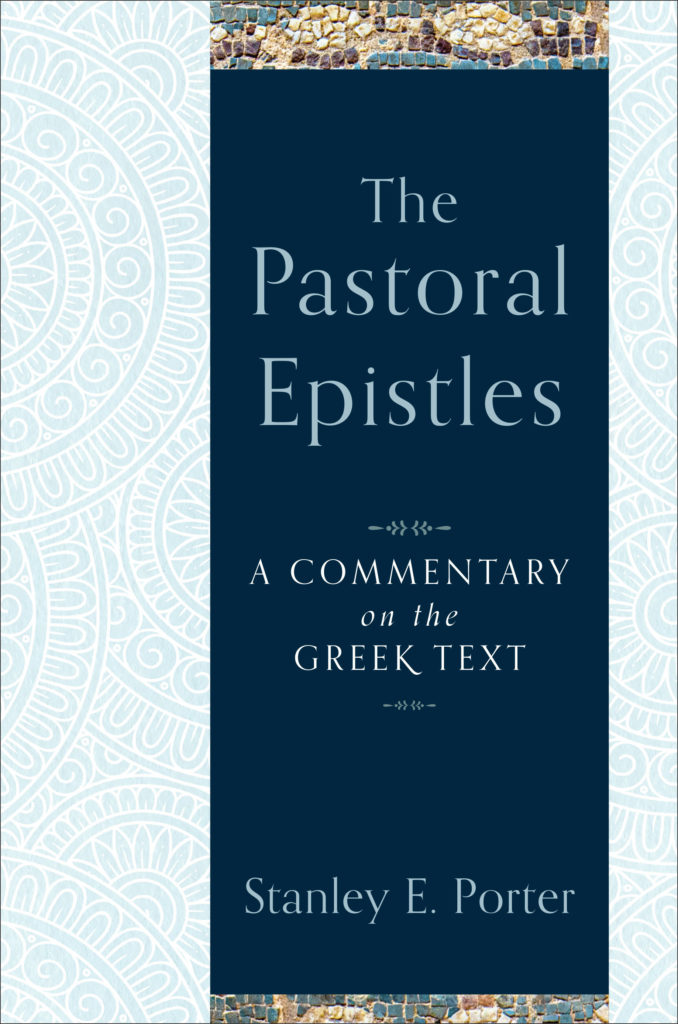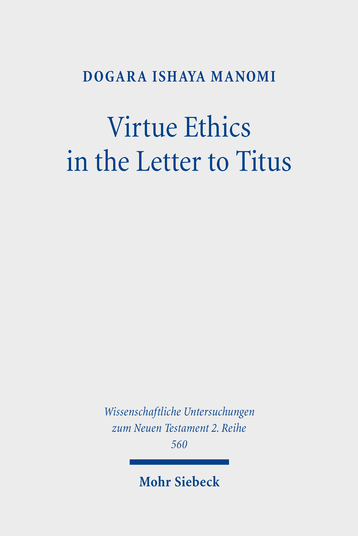Titus 1:12 has received disproportionate scholarly attention in the letter to Titus, both because of its citation of a pagan writer and its early example of what is often called the “liar paradox.” John Granger Cook has contributed a new treatment of the verse to the literature:
John Granger Cook, “Titus 1,12: Epimenides, Ancient Christian Scholars, Zeus’s Death, and the Cretan Paradox.” Zeitschrift für Antikes Christentum / Journal of Ancient Christianity 25.3 (2021): 367–94. https://doi.org/10.1515/zac-2021-0032
Abstract: “Many logicians and exegetes have read Titus 1,12 as an example of the Liar’s Paradox without paying sufficient attention to the nature of ancient oracular utterance. Instead of reading the verse as a logical puzzle, it should be read from its ancient context in the history of religions—a context of which ancient Christian scholars were aware. The Syriac scholars preserved a shocking Cretan tradition about Zeus’s death that probably goes back to Theodore of Mopsuestia. The god responsible for Epimenides’ oracle presumably rejected the Cretan tradition of Zeus’s death and tomb. The truth value of 1,12 consequently depends on the oracle and not the human being (i. e., Epimenides) who delivers the oracle. A reading sensitive to the history of religions preserves the Pauline author’s perspective in Titus 1,13: ἡ μαρτυρία αὕτη ἐστὶν ἀληθής. There is, consequently, a strong analogy between Caiaphas’s words in John 11:49–50 and those of Epimenides in Titus 1,12.”
_____________
As an aside, other literature focusing on this verse includes (chronologically) the following:
Lemme, Ludwig. “Über Tit 1,12.” Theologische Studien und Kritiken 55 (1882): 133–44.
Harris, J. Rendel, “The Cretans Always Liars.” The Expositor, 7th series, 2.4 (1906): 305–17; “A Further Note on the Cretans.” The Expositor, 7th series, 3 (1907): 332–37; “St. Paul and Epimenides.” The Expositor, 8th series, 4 (1912): 348–53; “Once More the Cretans.” The Expositor 8.9 (1915): 29–35.
Anderson, Alan Ross, “St. Paul’s Epistle to Titus.” Pages 1–11 in The Paradox of the Liar. Edited by Robert L. Martin. New Haven, CT: Yale University Press, 1970.
Renehan, R. “Classical Greek Quotations in the New Testament.” Pages 17–46 in The Heritage of the Early Church: Essays in Honor of the Very Reverend Georges Vasilievich Florovsky. Edited by D. Neiman and M. Schatkin. OCA 195. Rome: Institutum Studiorum Orientalium, 1973.
Folliet, G. “Les citations de Actes 17,28 et Tite 1,12 chez Augustin.” Revue des Études Augustiniennes 11 (1965): 293–95.
Lee, G. M. “Epimenides in the Epistle to Titus (1:12).” Novum Testamentum 22 (1980): 96.
Appel, Włodzimierz. “Epimenides [Tt 1,12].” Filomata (Kraków) 362 (1984): 221-30.
Zimmer, Christoph. “Die Lügner-Antinonie in Titus 1,12.” Linguistica Biblica (Bonn) 59 (1987): 77–99.
Stegemann, Wolfgang. “Anti-Semitic and Racist Prejudices in Titus 1:10–16.” Pages 271–294 in Ethnicity and the Bible. Edited by Mark G. Brett. Biblical Interpretation Series 19. Leiden: Brill, 1996. Translation of “Antisemitische und rassistische Vorurteile in Titus 1,10–16.” Kirche und Israel 11 (1996): 46‒61.
Kidd, Reggie M. “Titus as Apologia: Grace for Liars, Beasts, and Bellies.” Horizons in Biblical Theology 21.2 (1999): 185–209.
Faber, Riemer. “‘Evil Beasts, Lazy Gluttons’: A Neglected Theme in the Epistle to Titus.” Westminster Theological Journal 67 (2005): 135–45.
Thiselton, Anthony C. “The Logical Role of the Liar Paradox in Titus 1:12, 13: A Dissent from the Commentaries in the Light of Philosophical and Logical Analysis.” Biblical Intepretation 2 (1994): 207–23. Reprinted as “Does the Bible Call All Cretans Liars? ‘The Logical Role of the Liar Paradox in Titus 1:12, 13: A Dissent from the Commentaries in the Light of Philosophical and Logical Analysis.’” Pages 217–28 in Thiselton on Hermeneutics: Collected Works with New Essays. Grand Rapids: Eerdmans, 2006.
Gray, Patrick. “The Liar Paradox and the Letter to Titus.” Catholic Biblical Quarterly 69.2 (2007): 302–14.
Vogel, Manuel. “Die Kreterpolemik des Titusbriefes und die antike Ethnographie.” Zeitschrift für die Neutestamentliche Wissenschaft 101 (2010): 252–66.
Koskenniemi, Erkki. “The Famous Liar and the Apostolic Truth.” Filologia Neotestamentaria 24.44 (2011): 59–69.
Wittkowsky, Vadim. “‘Pagane’ Zitate im Neuen Testament.” Novum Testamentum 51 (2009): 107–26; Warum zitieren frühchristliche Autoren pagane Texte? Zur Entstehung und Ausformung einer literarischen Tradition. Beihefte zur Zeitschrift für die neutestamentliche Wissenschaft 218. Berlin: de Gruyter, 2015.
Szabó, Attila. “Páli paradoxonok avagy ‘szolgálati’ paradoxonok.” Studia Universitatis Babeș-Bolyai. Theologia reformata Transylvaniensis 60.1 (2015): 84–122.
Harrill, J. Albert. “‘Without Lies or Deception’: Oracular Claims to Truth in the Epistle to Titus.” New Testament Studies 63.3 (2017): 451–72.
Allen, Isaiah Luke. “Paul the Bigot? Reading the Cretan Quotation of Titus 1:12 in Light of Relevance Theory.” PhD thesis, Middlesex University / London School of Theology, 2019.
Hoklotubbe, T. Christopher. “Civilized Christ-Followers among Barbaric Cretans and Superstitious Judeans: Negotiating Ethnic Hierarchies in Titus 1:10-14.” Journal of Biblical Literature 140.2 (2021): 369–90.


